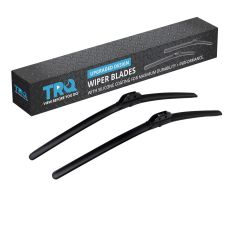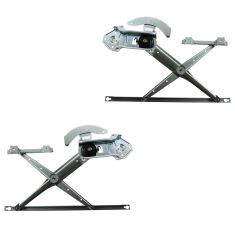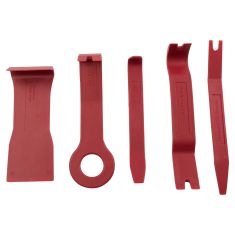Replaces
1997 Dodge Ram 2500 Truck Front Driver & Passenger Side 2 Piece Power Window Regulator Set TRQ WRA50900
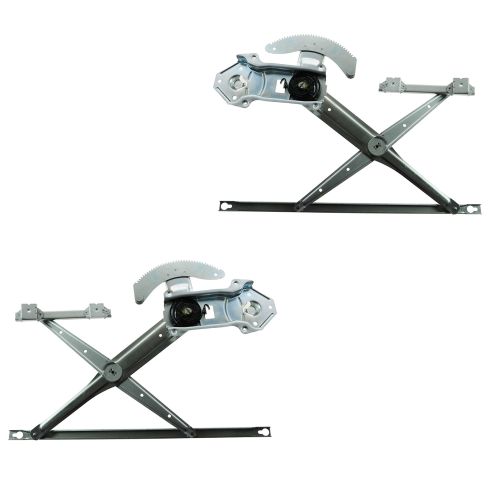
WRA50900
This part doesn’t fit a . Select from parts that fit.
Specify your vehicle's year, make and model to guarantee fit.
This part doesn't fit a . Select from parts that fit.
Buy in the next and
Recommended for your 1997 Dodge Ram 2500 Truck
Frequently bought together
Specify your vehicle's year, make and model to guarantee fit.
This part doesn't fit a . Select from parts that fit.
Part Details
- (1) Front Passenger Side Window Regulator
- (1) Front Driver Side Window Regulator
- without Motor
- 2 Piece
- Power
Specifications
- Driver & Passenger Side
- Front
About TRQ:
TRQ is a trusted brand dedicated to making every repair a success story by combining premium parts with easy installation. Each TRQ part is engineered by a team of automotive experts to meet or exceed OEM standards, delivering enhanced performance and maximum longevity. With rigorous in-house testing, the brand ensures superior fit and function across every product line. TRQ also provides customers with best-in-class, step-by-step installation videos—so you can complete repairs with confidence, whether you're a first-time DIYer or an industry professional.
Product Features
Note: This window regulator is designed to work with factory style motors only. Due to variations in aftermarket designs, replacement motors may not have the correct gear style.
This window regulator is a high quality aftermarket part that meets or exceeds the performance of the original. Subjected to extensive testing and quality control standards, allows us to offer this regulator with our superior warranty!
Attention California Customers:
![]() WARNING: This product can expose you to chemicals including Lead and Lead Compounds, which are known to the State of California to cause cancer, and birth defects or other reproductive harm. For more information, go to www.P65Warnings.ca.gov.
WARNING: This product can expose you to chemicals including Lead and Lead Compounds, which are known to the State of California to cause cancer, and birth defects or other reproductive harm. For more information, go to www.P65Warnings.ca.gov.
Lifetime Warranty
This item is backed by our limited lifetime warranty. In the event that this item should fail due to manufacturing defects during intended use, we will replace the part free of charge. This warranty covers the cost of the part only.
FREE Shipping is standard on orders shipped to the lower 48 States (Contiguous United States). Standard shipping charges apply to Hawaii and Alaska.
Shipping is not available to a P.O. Box, APO/FPO/DPO addresses, US Territories, or Canada for this item.
Expedited is available on checkout to the United States, excluding Alaska, Hawaii.
Final shipping costs are available at checkout.


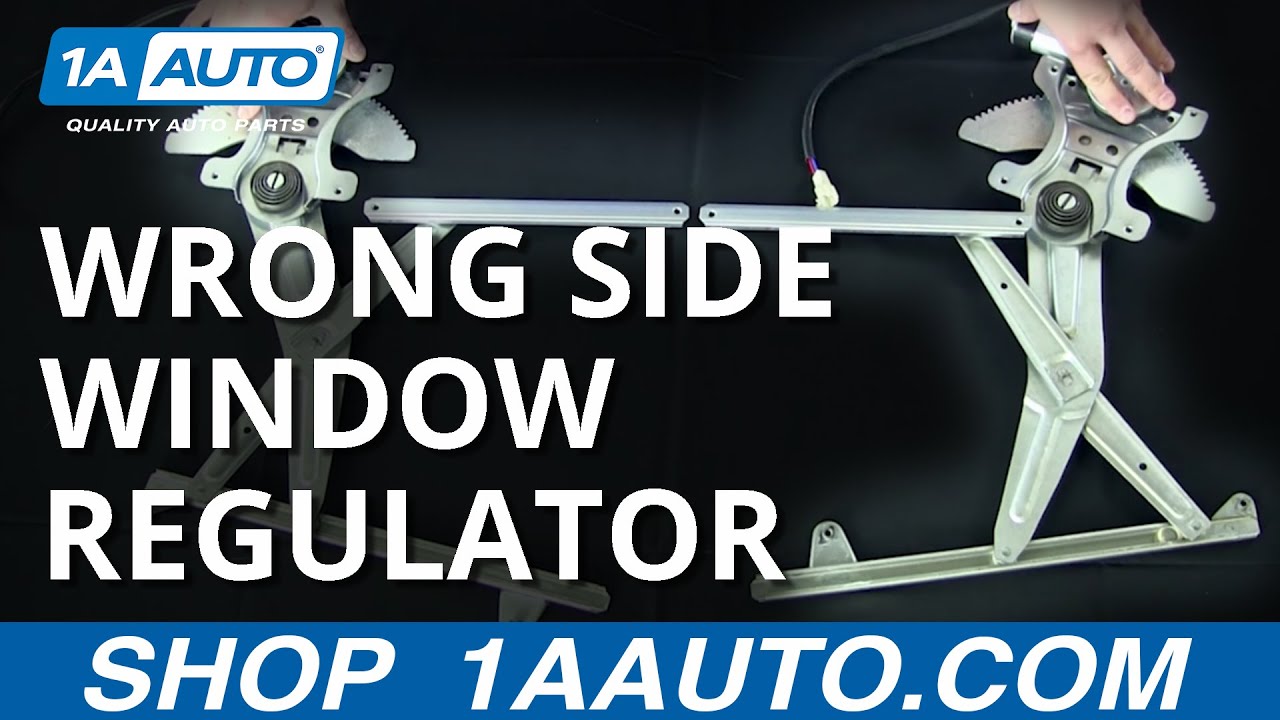
Created on:
Tools used
- Lay the old regulator and the new one side by side Pick the new regulator up by the motor side Flip the new regulator arms around to match your old regulator
Brought to you by 1AAuto.com, your source for quality replacement parts and the best service on the Internet.
Hey, I'm Brian, I'm here to give you guys a little tutorial on some window regulators. The specific design is the scissor design. We actually get a lot of calls on these products here and the common question is: The part I received seems different than the part in my vehicle.
The scissor design actually has a flip design and we're actually going to show you how to fix this here. The most common thing that you want to do, or the first step you want to do is lay the parts out side by side. Try not to match them up in the car because this can get confusing. Take it out, lay them side by side, and what you actually see here is a same exact part for the same model vehicle in the same door. As the appearance shows here, they seem to be mirrored.
If you look down at the bottom here, we have the power window motor. This is the piece that is actually powered to lift and lower your glass. The next section down here is . you actually have your gear drive. Here's your mounting plates on both. As you can see, it's identical. You have your tension spring here. If you notice on the upper section here, it's kind of reversed. You're going to think normally, I get the wrong side door. You're going to give us a call and you want to express that to one of our customer service reps. I'm going to show you how to fix this.
Basically, pick this up by the base and you want to scissor or flip. This is how you're going to fix the issue. It's going to actually match the component as shown there. You can now see that both of these components here are the same part and you're ready for installation.
You should be good to go. Click on Subscribe or check us out at 1AAuto.com. We'd be more than happy to have you join on board and join the 1AAuto team.
Thanks for tuning in. We hope this video helps you out. Brought to you by www.1AAuto.com, your source for quality replacement parts and the best service on the Internet. Please feel free to call us toll-free, 888-844-3393. We're the company that's here for you on the Internet and in person.
Tools used
- Remove the two Phillips screws from the door pull Remove the Phillips screw from the mirror panel Inspect the perimeter of the door panel for Phillips screws Pry out the door panel from the clips with a trim tool Slide the door panel up Slide the door panel toward the front of the vehicle Disconnect the mirror wiring harness Pry the power switches up Slide the power switches through the door panel Remove the door panel
- Remove the four Phillips screws from the speaker Pry the speaker out Disconnect the speaker wiring harness Loosen the 10mm bolts holding the window to the window regulator Slide the window over from the bolt Raise the window by hand Hold the window in place with painter's tape Disconnect the window motor lead Loosen the five 10mm bolts that hold the window regulator Pull the window regulator out through the door Remove the three 10mm screws from the window motor while watching for pinch points Watching for spring tension, tap the motor off the window regulator
- Watching for spring tension, slide the window motor onto the window regulator Tighten the three 10mm bolts to the window motor Insert the five bolts to the window regulator Insert the regulator into the door Hang the regulator by its bolts Tighten the 10mm bolts into the regulator Remove the painter's tape from the window Lower the window onto the regulator Slide the window onto the 10mm bolts Tighten the two 10mm bolts that hold the window to the regulator Connect the window motor lead Connect the speaker wiring harness Press the speaker to the door Tighten the four Phillips screws to the speaker
- Clip the power window switch into the door panel Press the clips onto the door panel Slide the door panel through the door handle Press the door panel onto the door Tighten the two Phillips screws to the door pull Tighten the Phillips screw to the corner mirror panel
Hey, friends. It's Lenny here with 1A Auto. Today we're going to be working on our 1996 Dodge Ram 1500, and I want to show you something super cool, replacing a window regulator. It should be fairly simple. I can do it and you can do it too. As always, if you need this or any other part, you can check us 1aauto.com. Thanks.
Okay, so we've got a couple Phillips head screws, one here and one here. We'll take those out. We've got our two screws, they're both the same. This right here can move around now, that's nice. Cool. All right, we've got another screw up here. Get that out of there. It looks the same as the other two, nothing special. Set all three of those aside.
Now this door panel, we're just going to feel around and make sure that there's no more screws. Sometimes you'll feel a couple coming along the bottom there. This does not feel like it has any, so we're doing all right. We have a couple of plastic trim tools. The reason why we're using plastic is because we're going to be going up against the paint. If you're worried about your paint, then of course you don't want to scratch it up with metal.
Just come right in here like this. I'm just going to go right along. Okay. Lift this up as you go. You're going to just jam it towards the forward position or I guess towards the front of the vehicle. There we are. That's just because on the backside of this, you've got all these little clips and they go inside these hooky-dos. These things, I don't know why Dodge did it, but they've got some so you need to slide straight up and down, you've got something that you need to slide forward and back. Whatever, I'm sure they had their reasons.
But anyway, we've got this almost off now, so now what we're going to do is we're going to get the wiring off of the back here. The next thing we're going to want to do is disconnect this right here. There's a little tab. You can usually grab it with your thumb. If you can't, small pocket screwdriver. Just grab it, pull it away, give this top area a little wiggle, and it should want to slide right out. Awesome.
Right here there's a little tab. You can you use your thumb if you want and try to push it, just be careful for a pinch. I'm going to use this. I'm just going to press right here, that lets this come up. Now if we come to this side, you can lift right up on this. Awesome. I'm just going to go right like this. Let's see if I can get it to go down and through. This is great. Now we can get our door panel right out of the way, and keep on plugging away.
Here we are friends, we've got our left side door speaker here. We're going to remove the four Phillips head mounting screws. This is what those look like? They're all the same. We'll set them aside so we can't lose them. I'm just going to grab the speaker and give it a little wiggle. It's been on there for a long, long time. Pull it out of there carefully. All right. Before we remove that, I'm going to use my forky tool and go right along the door here and just try to get the connector to come off with the door. It's just held in by a little push pin. I'll get this in there. There it is.
That gives us a little bit more Slack to see what we're dealing with here. You've got yourself a little push tab. Okay. If you can't push it with your thumb, that's fine, just use your pocket screwdriver. Go right in between here, give a tug while you're doing it, and it comes right off.
Okay. So, we want to check down along the bottom here, this is the channel, with our window all the way down. You can see where one of your nuts is right there, and that just closes this clamp down and holds onto the window. I'm just going to take my 10 millimeter and loosen that up a fair amount. It doesn't need to come all the way off. That looks pretty good. Do the same thing to this one. You can see it right through here. There, nice. Just give us a little wiggle. Awesome.
All right, so now that we have both these nuts loose, what we're going to do, is we're going to try to slide this lower channel to the left so that the nut right there lines up with the hole. Make sure these are loose. That's good. I'm just going to stick my finger on the side and just try to slide that over. Awesome. Cool. This looks like it's pretty close to being ready to come off here. There it is. Let's get that out of there. There we go. Slide it up. That's pretty good. Get our tape ready. Start from whichever side you want inside, outside, just stick it on there. Come up and over. Awesome. Let's move along.
All right. We've got the window taped up, that's great. We have a bolt here, here, here, here, and then of course this right here. Okay? If you don't feel like pulling off all this vapor barrier and potentially tearing it and causing a big old mess, just take a nice little razor blade, put a couple of little slashes just so you can get to where the bolt is and you can draw it out. Okay. You just pull it right out through there. That's a much smaller issue than of course, having a big rip in it. A little hole like this really isn't going to cause an issue because, man.
Okay, so let's grab our 10 millimeter. Right here, it should go right on this one. That's what one of our bolts looks like by the way. Bolt number two, the same as the first. Awesome. We're going to keep on rolling here. There we go. I think this one's the Kappa boy. Awesome. Let's get our bolts out of there. That's another shorty. You've got one, two, three, four shorts and two longs. Okay.
We've got our electrical connector right here. Try to get this off of there. Just pull the little tab, and then you should be able to pull down. Awesome. We're going to bring this over. Now we're going to do whatever we have to do to get it out of this door. Be careful for any pinch points. Tada.
Okay, so we have our window regulator unit here and the motor is still attached. What we're going to do, we're going to take out these three 10 millimeters. You need to be careful because a lot of times this is under spring tension, which is right here. And the motor could be holding this cog in a spring loaded position. Once we take this off the spring, might want to say, "I had enough of this. I'm out of here," and this gear could come spinning.
Just be super careful for any pinch points, and let's continue. 10 millimeter. All right, things are getting loose here. One screw, two. Okay, all three are out. This hasn't done anything crazy yet so that's cool. I'm Just going to give the motor a little bonk. There we go. That came right out of there, and it was under spring tension. Awesome.
Here we are friends, a quick product comparison for you. Over here, we have our left front window regulator out of our 1996 Dodge Ram 1500. Right here, we have our brand new quality 1A Auto part. As you can tell, both these parts are the same exact part. You've got your sliding rod here, this goes along the bottom, right? You've got your cog, super important. Got the area where your motor is going to go onto, the three bolt holes, also super important. This part right here has everything that the original had in exception of just the motor, but you just swap that over or you can go on 1aauto.com and buy yourself one of those as well.
With that said, I don't see any reason why this wouldn't be a quality part to install into the vehicle, so I want to go ahead and do it. As always, if you need this or any other part, you can check us out 1aauto.com. Thanks.
All right friends, so here we go. It's time to install our motor onto our regulator. To do that, we're just going to take this and we're going to be careful because this is going to put it under slight spring tension right here. As we turn this, the spring is starting to get tighter and tighter and it wants to let go. Okay? You can start at wherever you want.
Now we're going to take our motor. We're going to line up our three holes with the three holes in the regulator. It should just set right in just like this. That looks great. I'm going to turn the whole unit over and now I can see my screw holes from the back side. We'll take our three bolts that we have here, they're just 10 millimeter heads, the same bolts that we removed. I'm going to start it in here. Get that in. There it is. This one. We're not going to tighten any of these up until we get them all started. That's very important in case you have to wiggle this motor around. That looks pretty great. Awesome. Let's snug them up. That's tight.
Just take it to the point that when you're tightening it bottoms out and then just a teeny bit more, that's all you have to do. You don't have to go too tight on it there Hercules. You don't need to use a half inch air gun or anything crazy like that, just a little quarter inch ratchet. Bottom it out and then give it a little extra. This unit's ready to be installed into the vehicle. Let's do it.
All right, so now that we have this all together and waiting for us, I'm just going to plug it in. There we go. I'm going to hold onto the motor itself. There we are. I'm going to disconnect this, I'm going to turn off the key to the vehicle, and we can continue.
All right, so we're just going to start a couple of these bolts. Do this one right here. It's easiest to do this before you get it in the door. Once it's in the door sometimes getting these started isn't the easiest. Just a couple threads, we don't want them tight because obviously they have to hold onto the door. We're going to get this inside the door. We're going to slide these down into their corresponding holes. Once they're in there, it'll hold that for us and we can continue.
It just slides in. Okay, one of my screws right there. Let me see I can find the other one. Awesome. This one's sitting down here. That one sitting there. Once we push this these should line up. Grab some more of our bolts here. There we are. Now we've got this arm. We're just going to bring that up to where it belongs. We're going to line up these holes with the holes up here.
You can see one of our holes. Okay. I can't tighten it up yet because I still have to get another ones started. Get this bolt started in. The six bolts are started. Double check, it looks good. All right. Now we're just going to snug all these up and then we can move along to the next step. There we are. Awesome. Let's move ahead to the next step.
I'm just going to plug this back in. Trying to get our speaker connected in. I'm just going to try to grab the electrical connector. You have your lock, lock there. It should slide in. Give it a tug. Nice. Okay. I'm just going to bring this down here. Get the little push pin pushed into its hole. Just press that into its hole, going to hold it nice and tight. Take our speaker and we'll mount it up.
We're just going to put the key in the On position. We're going to bring this so we get this hole here and this one right here, and we want to make sure that we can see it because we're going to need to tighten up the bolt that's going to be right there. Once you get it to a good working level, turn back off your key power.
Here comes the fun part. This is where we're going to be bringing the window back down. You want to make sure that you don't have anything slippery on your hands. We're going to be grabbing the glass, slowly lowering it down and trying to line up those bolts with these holes right here, and then sliding this in to latch it in.
Here we go. I'm just going to leave the tape dangling on there in case I need to put it back up for any reason, it's doubtable but you never know. Going down. Okay. Let's see right here. There's one. Bring it down just a more. Push that in. Slide this over, hopefully it'll lock it. Come on baby. Awesome. Okay. Both of those studs are through this rod and then the nuts are holding it into the locked position. We're just going to snug these up and then we'll test the function of the window before we continue.
All right, so we're going to put the key in the On position. Awesome. We're just going to test the window and make sure it goes up and down. Upsy daisy, and down. Ooh, very nice. Okay. I'd say that works pretty good. I'm going to leave it just like this because what do I have to do now? I'm going to have to clean this down at the end, so I'll leave it right there. Take my key out of the ignition and now we can continue.
All right. It's going to be time to get the door panel on here. Before we go ahead and do that, we're going to take out all these push pins. All right. We're going to put them right into the door panel and then we'll put the door panel in and the push pins will hold it to the door. To do that, you're going to use something as simple as this, it's a little forky tool. Just like that, give it a little twist, whatever you got to do to get these puppies to pull out. They make them nice and long for you. That's what they look like. They've got a little ear there and that's where it's going to slide over the door panel, and then these little ears right here are what hold it into this hole. We'll take all these out and we can continue.
These little tabs, the push pins, got that area right there that I showed you before. It just slides right in. Okay. Bonk. There we are. Do the same for all of them and then we can continue.
Okay, friends, let's get this door panel on. I'm going to take the electrical connector or the electrical harness here and try to bring it up and through this. It can be a little tricky sometimes to try to get out of the way. Just give it a--there it is. You just have to be a little forceful with it sometimes, that's okay. We've got our electrical connector right here for our mirror switch. We're going to plug that in. You can tell which way it goes because it has this little nub right here and that lines up with the nub in there. Slide it in, give it a tug. Don't pull the whole thing right off the door though. Put that back on there. Cool. All right, let's bring this up.
What we're going to pay attention to now is the door handle, just going to try to pull the door handle through its hole. Slide this over. Awesome. We've got our lock. Just take the lock, just bring it right through the hole. Awesome. Bring the door panel down, get it so all of our little push pin/pecans are going to be lined up with our holes. Once you get a couple of them started in, generally speaking, all the rest will be lined up. The hardest ones for me to see are the top ones. It is important to get them lined up. Awesome. Down along our side here. The same thing along this side. Just line up as many of them as you can before you start bonking them in. One of the center here, it is lined up but not going in. There it is. Oh yeah. Move this a little bit.
You just want to make sure that your door lock can flow up and down easily. If I can't, this could be wedged a little bit. Maybe bar got bent in some of the process that you were doing. If that's the case, well, you're just going to have to pop this back out of the way and see what you can do about bending it because you want this to make sure that it can go up and down. That looks really great. I would say we can continue.
Now we're going to take our long screw and we're going to go right up in here. Just try to find the hole real quick and then we'll get out of the way. There it is. Okay. We don't need it to be too tight. We don't want to break the plastic or anything, we just need it to pull this right up against. That looks pretty great. We can move along.
Grab our switch here, it's just going to slide in. Let's take a look at. It goes in the back side first and then the front side. Bonk, bonk, very nice. We're going to grab our little cup with our two mounting screws, put it facing the right way. You've got your holes, you can see where it goes right down into the door. Phillips head. Start that one in. Start this one in. Okay. We're just going to bring it all the way down. Get that snug. Awesome.
Thanks for watching. Visit 1aauto.com, your place for DIY auto repairs, for great parts, great service, and more content.
WRA50900
877-844-3393
Monday - Friday 8:00am - 9:30pm ET
Saturday - Sunday 8:00am - 4:30pm ET
Specify your vehicle's year, make and model to guarantee fit.
This part doesn't fit a . Select from parts that fit.







